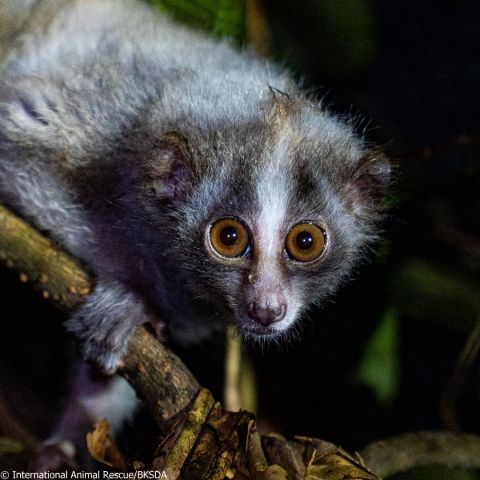
On 8 August 2020, the team at IAR Indonesia transported 10 Critically Endangered Javan slow lorises to the Mount Sawal Wildlife Reserve (SMGS) in Ciamis, West Java. Here they will undergo habituation before their complete release into the rainforest. The lorises must pass through the habituation process before they can finally be set free.
The lorises consist of four males and six females: Neira, Ical, Kaja, Putra, Arimbi, Switch, April, Gatotkaca, Neno and Noku. Most of them have been surrendered by members of the local community to the Natural Resources Conservation Agency (BKSDA) in the West Java region since 2018. They have since undergone lengthy rehabilitation at the International Animal Rescue (IAR) Primate Rehabilitation Centre in Bogor, West Java. The facility is the only one of its kind in Indonesia.
During the lorises’ habituation, the team in the field will continue to observe and record the changes in their behaviour for two to four weeks. If during the habituation period all the lorises are active and don’t display any abnormal behaviours, then they can finally be set free.
IAR vet Nur Purba Priambada explained that the ten slow lorises were confirmed to be ready to return to their natural habitat after going through a series of treatment and recovery procedures such as quarantine, medical examinations and behavioural observations at the rehabilitation centre.
They have to go through a long process to restore their wild nature. Their condition when they first arrive at the centre is generally very poor. They are usually suffering from stress, trauma and malnutrition, and they often display behavioural changes because their needs as wild lorises haven’t been met. They have been deprived of a suitable living environment and appropriate food and have been unable to behave as they would in the wild.
The normal treatment procedures at the centre have been reinforced in light of the pandemic situation. IAR’s teams, using masks and other PPE, have reduced contact with the animals even more than usual and the number of personnel working in the field has also had to be reduced.
“During the pandemic, we have improved the health and safety protocols covering release activity to minimise the risk of disease transmission. We have ensured that the implementation of protocols such as physical distancing and using masks is carried out properly,” explained Purba.
All adjustments during the release procedure are part of efforts to eliminate the potential for transmission of COVID-19 and other zoonotic infectious diseases and ensure that the release and other conservation activities can still run even in the midst of the pandemic.
Warid, Forest Ranger at the Natural Resources Conservation Agency of Ciamis Region, said that the slow loris conservation programme in the SMGS area is a collaboration between the Central Natural Resources Conservation Agency of West Java (BBKSDA Jawa Barat) and IAR Indonesia.
This programme is part of efforts to support the survival of slow lorises and their ecological functions in the area, as well as to conserve their population whose numbers continue to fall owing to hunting and illegal trade.
“SMGS is a conservation area with an ecosystem that is considered suitable as a place to conserve and protect the survival of slow lorises,” he said. “Based on results of the survey conducted by the IAR Indonesia and BKSDA Ciamis team, the area has good potential in terms of security, availability of food, shade and several other vital components in loris habitat.”
Alan Knight OBE, IAR Chief Executive, said: “The keeping of slow lorises as pets is having a devastating impact on wild populations, particularly as, their natural habitat is also under threat. So it’s always extremely uplifting to see animals returning to the wild where they will be given a second chance to live their lives as nature intended, far from disturbance and interference from human beings.
“The IAR Indonesia team has invested a huge amount of time and effort into helping these little primates recover and return to their wild behaviour: congratulations to the vets and keepers and to the BKSDA for now returning them to freedom in the forest.”

